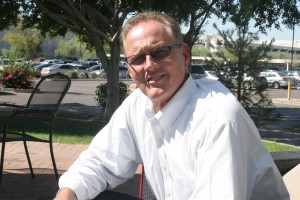Former Phoenix Mayor Paul Johnson is a leader of the Open Government Committee, which is promoting a ballot proposition that would establish open primaries in Arizona. (Cronkite News Service Photo by Sean Peick)
By SEAN PEICK
Cronkite News Service
PHOENIX – As mayor of Phoenix, Paul Johnson found city officeholders and candidates more willing to seek common ground and less beholden to groups promoting narrow interests.
The reason, he said, was the city’s nonpartisan primaries.
“It created substantially better results,” Johnson said.
Then came running for governor in partisan primaries. And seeing rising public discontent with divisive politics.
Those experiences, he said, are behind his support of a ballot proposition that would create open primaries for state offices. If approved in November, Proposition 121 would have the top vote-getters advance to the general election regardless of party.
Johnson joined with other business and civic leaders to form the Open Government Committee, which got the measure on the ballot and fought successful court battles to keep it there.
With relatively few voters currently taking part in primaries, especially independents, Johnson said open primaries would lead to a more inclusive government.
“It is a way to allow independents and independently minded Democrats and Republicans to have an equal voice with what has become an ideological extreme in both parties,” he said.
The group promoting that idea has raised a large amount of money along the way.
As of Aug. 24, the Open Government Committee had raised $965,000 and spent $954,000, according to its latest filing with the Arizona Secretary of State’s Office.
That’s the most to date among groups supporting or opposing the various ballot measures.
Save Our Vote, a group headed by Maricopa County Attorney Bill Montgomery that is opposing Proposition 121, had raised $33,000.
Even so, Johnson sees both sides’ finances as fairly even because his group spent more than $800,000 on petitions to get on the ballot. The group’s lawyers wrote off most of the fees from court battles that twice reached the state Supreme Court.
“We’re now with the media portion of the campaign,” Johnson said. “They’ve got to go run a media campaign, we have to go run a media campaign. The good news for us is we’ve already identified people who like our initiative and that’ll give us money.”
While Johnson shies away from outright declaring himself the group’s leader, he has also made the most significant financial investment in the form of a $150,000 loan earlier this year.
Forty-six of the 255 total contributions, including loans, totaled at least $5,000 each.
While the 177 individuals who donated gave a combined $284,000, 15 organizations donated a collective $334,000.
The largest donation was from Greater Phoenix Leadership, a coalition of Phoenix-area business leaders that has given $121,500 in six installments.
“We believe in representative democracy, we believe that every voice is important to be heard,” said Thomas Franz, the group’s president and CEO.
Professional Fire Fighters of Arizona, a union representing thousands of firefighters statewide, donated $100,000. Other contributing organizations included Cowley Companies Inc., the Southern Arizona Leadership Council and the Arizona Cardinals.
Sarah Smallhouse, president of the Thomas R. Brown Foundations of Tucson and a member of the Open Government Committee’s leadership, contributed $5,000. She said Arizona’s current primary system leads to elected officials who won’t work effectively with the business and nonprofit sectors.
“Together, with reinforcement, we can do a lot more than those three things working independently,” she said.
Having to spend so much money supporting open primaries is discouraging but necessary to Lea Marquez-Peterson, president and CEO at the Tucson Hispanic Chamber of Commerce, which has endorsed the effort.
“It’s important to educate our community so they understand what the particulars are in this initiative,” she said.
David Berman, a senior research fellow at Arizona State University’s Morrison Institute for Public Policy, said organization and fundraising ability don’t necessarily lead to a successful campaign. But Proposition 121 has a good chance to pass, he said, because of growing public dislike for partisanship and the success of similar systems in California, Washington and Louisiana.
One thing opponents have in their favor, Berman said, is that the Open Government Committee is proposing something new and unfamiliar to many voters.
“When people are confronted with something like that, they’re likely to say ‘no’ because they don’t want to gamble,” he said.
Some Donors for Prop 121:
- Greater Phoenix Leadership Committee – $121,500
- Professional Fire Fighters of Arizona – $100,000
- Mark Sklar, managing director of DMB Associates Inc. – $35,000
- Cowley Companies Inc. – $25,000
- Arizona Pipe Trades 469 (PAC) – $20,000
- James Kaufman, retired developer – $20,000
- Philip Francis, retired executive chairman of PetSmart Inc. – $20,000
- United Food & Commercial Workers Local 99 General Account – $20,000
- William Post, former chairman of the board of Arizona Public Service and Pinnacle West Capital Corporation – $12,500
- Mary Kay Post, retired – $12,500









No comments:
Post a Comment